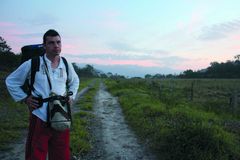
Fabián Laverde, COS-PACC member. The organisation also supports victims of extrajudicial killings in Casanare.
Article published in the special Newsletter '15 years of PBI', October 2009
Kristina Johansen, volunteer from Norway (2006-7)
Gustavo Gallardo, a lawyer from the Political Prisoners Solidarity Committee listens to victims of extrajudicial killings in Casanare.
On 16 April 2007, an army GAULA1 unit allegedly murdered the brothers Luís Guillermo Robayo Mora and Rubén Darío Avendaño Mora, 25 and 14 years old respectively, in Hato Corozal (Casanare)2. Their parents, the farmers Jorge Avendaño and Guillermina Mora, explain their sons had gone to purchase cattle in Paz de Ariporo, but never returned. Instead, the authorities presented them as two guerrilla members killed in combat.
I recall the solemn stare of the two surviving younger siblings when I was at their farm in June 2007, while accompanying the lawyer Gustavo Gallardo from the Political Prisoners Solidarity Committee (FCSPP). We were on our way to the town of Sácama when we passed by some soldiers who were on highway patrol. «You are traumatised and the children are also very traumatised. They have had trouble with school, because they’re affected by what happened to their brothers. They don’t say anything, but they think about it. And you also realise that perhaps it’s not about their brothers, rather they’re thinking something could also happen to them or to us», says Jorge Avendaño.
Unfortunately, the experience of the Avendaño Mora family is not unique. According to a report by the Public Prosecutor’s Office, up to 20 December 2008, this institution was investigating 848 cases known as «false positives», in which 1.375 persons died3. Of these 848 investigations, 768 correspond to cases after 2004. Of these, most were reported in 20074. During this year and up to the present, PBI has been accompanying persons who have played a fundamental role in reporting cases on this reality. The work of human rights defenders consists in providing workshops, gathering information on reported abuses and advising the victims, from the cities to the most remote areas of the country. This work also entails directly confronting the alleged responsible parties in the military criminal justice system –where the investigations generally begin- as well as in the ordinary justice system. Another important task is to encourage public discussion of this issue. By going public, the family members and their lawyers run the risk of being stigmatised, threatened and even murdered 5.
When, as PBI volunteers, we accompany these processes, we familiarise ourselves with the pain, fear and anger of the family members, but also all the other persons who accompany them in their fight.
I remember the night we accompanied Gustavo Gallardo to a park in Yopal, where he met with a woman whose husband had been recently murdered. While I played with her five-year-old daughter, the woman told her story and cried on the lawyer’s shoulder. Gustavo, who has also suffered the effects of persecution and forced displacement, later told us he felt like crying with the widow, but that he held back because he thought he should give her strength and hope. The persistent work of human rights defenders and the courage of the victims makes the world see that the life of a farmer is worth as much as anyone else’s. As Jorge Avendaño says:
«What’s most important is for this not to remain unpunished. A person may not take away someone else’s life. No bible –or any law- says so».
1 Elite units, created by Law 282 of 1996, exclusively dedicated to preventing and acting against kidnapping and extortion. The units are made up of agents from the Administrative Department of Security (DAS), the Technical Investigation Unit (CTI), the Public Prosecutor’s Office and the military forces. Presently in Colombia, there are 16 army GAULA units and two navy GAULA units. (Source: www.ejercito.mil.co/index.php)
2 «A juicio ex comandante del Gaula por ‘falsos positivos’», El Espectador newspaper, 19 August 2009
3 «Nuevas capturas por falsos positivos», El Colombiano newspaper, 27 January 2009
4 «Más de mil militares: involucrados en falsos positivos», AFP/Terra Colombia, 28 January 2009
5 «Baseless Prosecutions of Human Rights Defenders in Colombia», Human Rights First, February 2009
